 It took me a couple of chapters to get into this book. But after the first appearance of Samarkar, I was hooked. Over the course of the book I came to be equally invested in all the main characters, but she was the one that first grabbed me. Let me just describe her badass-ness for a quick second: heir to an empire until her younger half-brother is born and she gets married off; unhappy in her new home, she gets her brother to come kill her husband; widowed, she decides to give up her Princess status and study wizardry, is neutered in order to gain magical power though with no guarantee of success or even her survival (how the magic system works for them). And that’s all before the story starts.
It took me a couple of chapters to get into this book. But after the first appearance of Samarkar, I was hooked. Over the course of the book I came to be equally invested in all the main characters, but she was the one that first grabbed me. Let me just describe her badass-ness for a quick second: heir to an empire until her younger half-brother is born and she gets married off; unhappy in her new home, she gets her brother to come kill her husband; widowed, she decides to give up her Princess status and study wizardry, is neutered in order to gain magical power though with no guarantee of success or even her survival (how the magic system works for them). And that’s all before the story starts.Overall, my favourite things about this book were the characters (particularly the female characters) and the worldbuilding. The characters in this book prove, as if it needed proving, that you can have well-rounded casts of characters (though they are skewed towards the elite of their various cultures) in epic fantasy. Everyone is a real person, and everyone’s strengths are acknowledged, whether it’s standing on a saddle in the middle of battle to shoot arrows with deadly accuracy, or just grimly gritting your teeth and not complaining about the blisters on your feet, or your own discomfort on a long journey.
I found the worldbuilding fascinating. From an external-to-the-book perspective, it’s important in that there’s a ton of discussion about non-Western fantasy settings going around in the SFF community, but I’m more interested in an internal-to-the-book perspective. There are several different cultures interacting in this book – in fact, with only one exception I can think of, I think every main character spends a large portion of the narrative outside of their culture of origin. Each character has times when they feel more or less comfortable–the steppe-raised man is claustrophobic and nervous among the mountains and in cities/palaces; the mountain-fastness-raised woman is agoraphobic in the open steppe. There’s a lot of worldbuilding done in this book simply through what is and isn’t familiar to each character in terms of ways of living that we might take for granted (do we sleep on a soft or hard bed? Raised or floor level? With or without a pillow? etc.). That was really interesting to me; how the the world was painted through details of character interaction both with each other and with their environment.
Maybe that is an obvious point, and it’s only my own little minor revelation as to the ways it was accomplished that makes me think it’s worth pointing out. But either way, the worldbuilding in this book is excellent.
The only problem I had with this book is that I got lost a time or two. I mean, physically lost in the world. Range of Ghosts is very much an epic fantasy; there’s a lot of walking to Mordor, so to speak. At one point, I’m pretty sure in my head the characters were crossing an entirely different mountain range than the one they actually were crossing, so when they came out the other side I was so confused. And this despite referring several times to the helpful map in the front of the book (I normally don’t bother to reference the maps in books). In the book’s defence, I believe this is entirely due to my own geography fail, and no lack in the book itself…
I definitely recommend this to fantasy fans. I had heard a lot of good things about this book before I read it, and it lived up to them all.
 This book was really well done, particularly the last few chapters. Hines did a good job at wrapping up the series in a way that felt honest to the characters.
This book was really well done, particularly the last few chapters. Hines did a good job at wrapping up the series in a way that felt honest to the characters.The previous three books in this series I read in a day or two each. This one took me over a month. I probably shouldn't have started reading Snow Queen's Shadow when I did, given that I was really more in the mood for light reads, which this book certainly isn't. Still, I enjoyed it, although it wasn't until chapter 20 or so that I really got sucked into the story.
Overall, I'm glad I read it, and felt it was a strong conclusion to the series. I look forward to seeing Hines' next series.
 Seraphina was a pleasure to read, a quick easy prose that sweeps you along and gets the job done. I read Seraphina in less than 24 hours, completely unintentionally, and I love reading experiences like that. Best of all, unlike many books I’ve read recently, this book acknowledges that it is just as hard (sometimes harder) to look at someone you love and tell a difficult truth as it is to fight a dragon. I loved that.
Seraphina was a pleasure to read, a quick easy prose that sweeps you along and gets the job done. I read Seraphina in less than 24 hours, completely unintentionally, and I love reading experiences like that. Best of all, unlike many books I’ve read recently, this book acknowledges that it is just as hard (sometimes harder) to look at someone you love and tell a difficult truth as it is to fight a dragon. I loved that.
The Sea Thy Mistress
 For my money, this was a very strong ending to the trilogy. If you liked the first two, you'll like this one. I want to re-read them back to back some time; I have the feeling that will bring out a lot of nuances I missed this time around.
For my money, this was a very strong ending to the trilogy. If you liked the first two, you'll like this one. I want to re-read them back to back some time; I have the feeling that will bring out a lot of nuances I missed this time around.Even still, I think this may be my favourite Elizabeth Bear book that I've read to date.
 The short version: overall I did really enjoy the book, but there were enough issues that I didn't love it.
The short version: overall I did really enjoy the book, but there were enough issues that I didn't love it.I have to admit I wasn't completely blown away. Now this could be because this book is not in my comfort reading zone, so I didn't have a lot to compare it to. (Which was actually another part of the reason I picked it up. While I love SFF, I've been a little too cozy there lately. I need to keep trying other things). And I will say that I did get sucked in: the last third to a half of the book I did have trouble putting it down, kept thinking about the story, picked it back up as soon as I could. All good things.
But there were some things that bothered me...
First off, the infodumps. The worst one of all was right at the start, too. An entire chapter of flashback here's-what-you-need-to-know, oy. All about economics and corrupt businessmen, double oy. In chapter one. I had a hard time getting into it, that's for sure. There were other culprits (pretty much any time a new character was introduced--although I feel that's a feature of literary fiction) but that was the worst one.
Second thing that bothered me: why does Blomkvist sleep with all the women? Not that there are that many to begin with (excluding the very large cast of walk-on or very minor roles, and of course Harriet since she's just a concept for most of the book), but I'm not sure that's a good excuse. It was Salander who really pushed this over the edge for me. Especially with the way the book ends... Not only do all the women sleep with him, they all fall in love with him too. Of course. I mean, he's the hero, so obviously.
Third thing: I didn't feel as if the two major plot threads really meshed together. Wennerstrom and Harriet. At first it seemed as if the whole Wennerstrom fiasco was there solely to give Blomkvist a reason to accept Vanger's offer. But then the Harriet case got wrapped up with a few chapters still left to go, and suddenly we're back to the Wennerstrom stuff. Which Blomkvist quite suddenly manages to solve and wrap up quickly, with absolutely no consequences even though he's in way more deep now, and when he tackled Wennerstrom the first time he got fined and a prison sentence. I dunno, I didn't quite buy it. And I didn't like how in both plot threads, they end because the major antagonist (Martin, Wennerstrom) dies. Really felt like a cop-out to me. I was convinced that Martin's death had been faked somehow, especially given the heavy weight of faked/uncertain death throughout the entire book.
Anyway, all that said, I did genuinely enjoy the book. It had problems, but it kept me reading. And I have to say kudos to the translator, Reg Keeland, because while you could tell it was a translation, and there were certain passages that made me stop and think "huh, I bet that section was a real bitch to translate," I have a feeling it is extremely well done. (Not knowing a lick of Swedish and not being able to check against the original to confirm).
I very much enjoyed the character of Lisbeth Salander. I have a feeling entire essays could be written about her. Probably have been. I'm not going to try, but I do think she's a good character for making you stop and think. About gender, disability (your own or others'), ethics, violence, abuse... and on. I was going to say something about her rape scenes and her vengeance, but I don't think I will--while reading the book I didn't see how I could avoid it in a review like this, but now that I've finished the book and it's been a few days, when I think of her I seem to think mostly of her in Blomkvist's loft, reading, on her first ever vacation. It's subtle, but I think that's where her character has a big moment of growth... and the more I think about it, the more I think she's the only character who does really grow. (Which I feel sad to say about Blomkvist since he does go through some horrible things, but... I'm not sure how he is really different from the start to the end).
 Paul Roche's translations are very good: readable and often preserving elements of the original Greek. Pay attention to his footnotes, though, since that is where he notes problem lines and/or his own interpolations (in particular in the Bacchae).
Paul Roche's translations are very good: readable and often preserving elements of the original Greek. Pay attention to his footnotes, though, since that is where he notes problem lines and/or his own interpolations (in particular in the Bacchae).I found his introductions not particularly useful, and the stage directions he inserted too heavy-handed and not allowing the reader to bring enough of his/her imagination to the text (not to mention that there aren't stage directions in the Greek). After reading one or two of the plays I simply skipped over them.
A final point is that the lack of line numbers makes these translations extremely hard to discuss or reference.
Overall, I enjoyed the translations themselves and thought they were well done, but I had some trouble with other aspects of the book.
 This was a solid anthology. Like most anthologies, a couple stories didn't do it for me, most were good, and a few great. Two of the stories that stood out the most to me were Tanith Lee's and K.D. Wentworth's.
This was a solid anthology. Like most anthologies, a couple stories didn't do it for me, most were good, and a few great. Two of the stories that stood out the most to me were Tanith Lee's and K.D. Wentworth's.
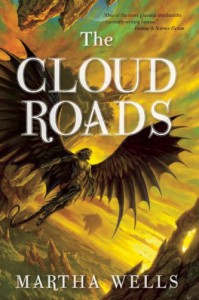 This book blew me away for its intense worldbuilding that somehow never once slowed down the story or the writing. Beautiful fantasy world with incredibly complex societies that (the Raksura in particular) are some of the most alien species I’ve ever read in fantasy, in terms of not feeling like a human culture transposed across time and space and with wings added.
This book blew me away for its intense worldbuilding that somehow never once slowed down the story or the writing. Beautiful fantasy world with incredibly complex societies that (the Raksura in particular) are some of the most alien species I’ve ever read in fantasy, in terms of not feeling like a human culture transposed across time and space and with wings added.
 Fast, fun, thoroughly entertaining. Lots of action, and a heroine who is witty and thinks on her feet. If any book I've read recently should be a movie, this one's it.
Fast, fun, thoroughly entertaining. Lots of action, and a heroine who is witty and thinks on her feet. If any book I've read recently should be a movie, this one's it.
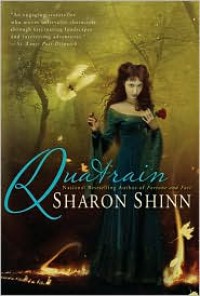 Four novellas, each one set in one of her worlds from her novels. For the first three, I'd already read all the novels set in those worlds, so they were a wonderful revisit to those places, to some of the characters. The fourth was set in the Twelve Houses world, which has several novels out by now, but I have yet to read them, and it was just as good as the first three. So whether you already know her worlds or not, this is a great collection.
Four novellas, each one set in one of her worlds from her novels. For the first three, I'd already read all the novels set in those worlds, so they were a wonderful revisit to those places, to some of the characters. The fourth was set in the Twelve Houses world, which has several novels out by now, but I have yet to read them, and it was just as good as the first three. So whether you already know her worlds or not, this is a great collection.
 Very fun SFF romance where the characters actually need time to heal. Looking forward to reading many more of these books.
Very fun SFF romance where the characters actually need time to heal. Looking forward to reading many more of these books.
 One of the best secondary world fantasies I have read in a while. The magic system in particular is very different from the usual fare--all based on wine. I think the strongest parts of this book are the characters and the worldbuilding. I recommend this to anyone who likes secondary world fantasies, of the type with catastrophic, change-the-world disaster looming, but a story tied fairly closely to the main character, not sprawling all over the place.
One of the best secondary world fantasies I have read in a while. The magic system in particular is very different from the usual fare--all based on wine. I think the strongest parts of this book are the characters and the worldbuilding. I recommend this to anyone who likes secondary world fantasies, of the type with catastrophic, change-the-world disaster looming, but a story tied fairly closely to the main character, not sprawling all over the place.
 I loved this book. Loved. Cat, Andevai, and Bee were such wonderful characters, as well as the host of secondary and minor characters. The worldbuilding is awesome, a completely real world where trolls emerged in the Americas, the Romans didn't crush the Carthaginians, and of course, there's magic. I will definitely be reading the rest of this series.
I loved this book. Loved. Cat, Andevai, and Bee were such wonderful characters, as well as the host of secondary and minor characters. The worldbuilding is awesome, a completely real world where trolls emerged in the Americas, the Romans didn't crush the Carthaginians, and of course, there's magic. I will definitely be reading the rest of this series.Update: reread this June 2013, and loved it just as much. I found the first part of the book in particular more nuanced--I caught more references and clues. This will be a series I reread many times over the years.
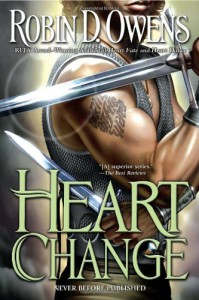 I bought Heart Change spontaneously last weekend, and on Sunday I read it cover to cover. Heart Change is the sixth Celta book I’ve read, and definitely one of my favourites from the series so far. (I haven’t read the series in order– I think each book stands on its own quite well, though there will be references to events and people from other books).
I bought Heart Change spontaneously last weekend, and on Sunday I read it cover to cover. Heart Change is the sixth Celta book I’ve read, and definitely one of my favourites from the series so far. (I haven’t read the series in order– I think each book stands on its own quite well, though there will be references to events and people from other books).As always with Celta books, I loved the rich worldbuilding, and enjoyed seeing a bit more of how all the families interact and/or are interconnected. My favourite aspect of Heart Change, though, was the progression of Signet’s and Cratag’s relationship. So often in romances there is *such* a fast progression of the relationship that you wonder, sometimes, what chance the couple really has for a stable longterm relationship after the book ends. But here, Signet and Cratag knew of each other, had met briefly at public events, had been attracted to each other, all before the story starts. So when the events of the story force them into close quarters with each other, their relationship moving to the next level feels very natural. They “date”, and have their ups and downs, and I very much enjoyed watching this progression of their relationship.
Overall, highly recommended to fans of the Celta series and fans of romance/ fantasy romance.
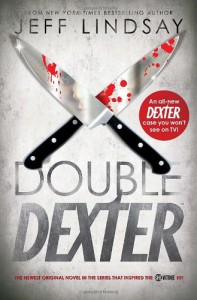 This is the 6th book in the Dexter series, and in my opinion one of the best so far. Aside from the first chapter, which I found overwritten and clunky, I thoroughly enjoyed this book, and will definitely keep reading the series. I think the main reason I have enjoyed books 5 and 6 of this series so much is the increasing role and pressure of Dexter’s family. His strengthening relationship with Cody and Astor, and all the new experiences Lily Anne brings to him, have really fleshed out his character and made him a much more 3D protagonist. I also really enjoy the progression of Deb’s character, and the way both Deb’s and Dexter’s growth has impacted their relationship as well.
This is the 6th book in the Dexter series, and in my opinion one of the best so far. Aside from the first chapter, which I found overwritten and clunky, I thoroughly enjoyed this book, and will definitely keep reading the series. I think the main reason I have enjoyed books 5 and 6 of this series so much is the increasing role and pressure of Dexter’s family. His strengthening relationship with Cody and Astor, and all the new experiences Lily Anne brings to him, have really fleshed out his character and made him a much more 3D protagonist. I also really enjoy the progression of Deb’s character, and the way both Deb’s and Dexter’s growth has impacted their relationship as well.Double Dexter was a very fast book, in the sense that three chapters from the end I found myself thinking there’s no way both major plot threads could be wrapped up in time. But they were, and you could probably claim it all fell very quickly into place a little *too* conveniently for Dexter, but meh, it worked for me.
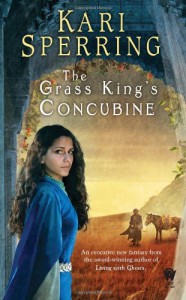 The short version: Lovely, rich prose. And shapeshifting ferret twins! How can you resist?
The short version: Lovely, rich prose. And shapeshifting ferret twins! How can you resist?The slightly longer version: This book is not a fast read. It needs to be savoured. I very much enjoyed it, from the language - beautiful, lyric - to the relationships. I especially loved Jehan and Aude's relationship, for the devotion but independance but partnership dynamic they have. And there was a lot I really liked about QiaQia that I can't really say without getting massively spoilery. But I hope there's more QiaQia story coming sometime.
Definitely recommended, and if you liked Living with Ghosts you will like this too.


